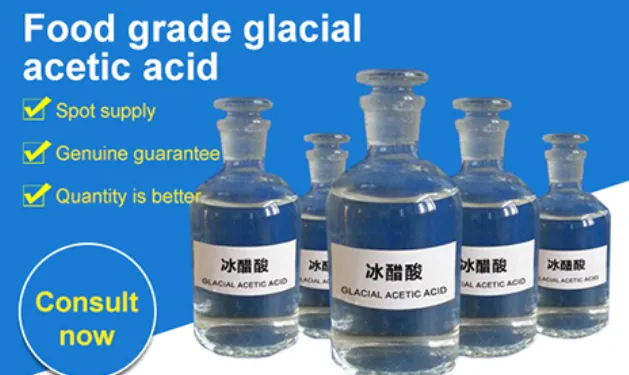
apr . 16, 2025 13:39 Terug naar lijst
Guide to Glacial Acetic Acid and Its Uses
Glacial acetic acid is a highly concentrated form of acetic acid used in various industrial, laboratory, and manufacturing applications. If you are looking for a glacial acetic acid supplier, understanding its properties, applications, and safety measures will help you make an informed purchase. This guide covers its key uses, sourcing options, and precautions to consider when handling it.

What Is Glacial Acetic Acid?
Glacial acetic acid is a colorless, corrosive, and highly concentrated form of acetic acid (99% purity or higher). The term "glacial" refers to its ability to solidify into ice-like crystals at temperatures below 16.6°C (61.9°F). It is widely used in chemical production, food processing, pharmaceuticals, and laboratory applications.
Properties of Glacial Acetic Acid
Chemical Formula: C₂H₄O₂
Appearance: Clear, colorless liquid with a strong vinegar-like odor.
Boiling Point: 118°C (244°F)
Freezing Point: 16.6°C (61.9°F)
Solubility: Miscible with water, ethanol, and organic solvents.
Corrosive Nature: Can cause severe burns and irritation upon contact.
Glacial Acetic Acid Uses
Glacial acetic acid is widely used across multiple industries, including:
Chemical Manufacturing: A precursor in the production of various chemicals, including acetates, acetic anhydride, and synthetic fibers.
Food Industry: Used as a food preservative and acidulant (when diluted to safe levels).
Pharmaceuticals: A key ingredient in medicines, antiseptics, and chemical synthesis.
Laboratories: Utilized as a reagent for titrations, pH adjustments, and organic synthesis.
Textile and Dye Industry: Helps in fabric dyeing and textile processing.
Cleaning and Disinfection: An effective descaler and disinfectant when properly diluted.
Safety Precautions When Handling Glacial Acetic Acid
Due to its corrosive nature, glacial acetic acid must be handled with care:
Wear Protective Gear: Use gloves, goggles, and lab coats when handling.
Ensure Proper Ventilation: Avoid inhalation by working in a well-ventilated area or fume hood.
Use Correct Storage: Store in tightly sealed containers away from heat and direct sunlight.
Handle with Care: Avoid direct contact with skin and eyes; rinse immediately if exposed.
Dilution Guidelines: Always add acid to water, not the other way around, to prevent violent reactions.
Finding a Reliable Glacial Acetic Acid Supplier
If you're searching for a glacial acetic acid supplier, consider the following factors:
Purity Level: Ensure the product meets industry standards (e.g., 99% purity for industrial use).
Supplier Reputation: Choose a supplier with good reviews, certifications, and experience in chemical distribution.
Quantity Options: Available in small lab-grade bottles to large industrial drums.
Regulatory Compliance: Ensure the supplier complies with safety and environmental regulations.
Safety Data Sheet (SDS): Always review the SDS for handling and storage guidelines.
Glacial acetic acid is a valuable chemical with diverse applications, from manufacturing to laboratory use. Whether you need it for industrial, pharmaceutical, or research purposes, choosing the right glacial acetic acid supplier and understanding its properties and safety measures is essential. Always ensure compliance with regulations and proper handling to maximize safety and efficiency.
Glacial Acetic Acid FAQs
Q1: Is glacial acetic acid the same as regular acetic acid?
A1: No, glacial acetic acid is highly concentrated (≥99%) and much stronger than regular vinegar or diluted acetic acid solutions.
Q2: Can I use glacial acetic acid for food applications?
A2: Only when diluted to safe concentrations and approved by food safety regulations.
Q3: Where can I find a reliable glacial acetic acid supplier?
A3: Industrial chemical suppliers, online marketplaces, and specialty laboratory supply stores offer reliable sources.
Q4: How do I safely store glacial acetic acid?
A4: Store in a tightly sealed, chemical-resistant container away from heat, moisture, and incompatible substances.
Q5: What precautions should I take when handling glacial acetic acid?
A5: Wear protective gear, ensure proper ventilation, and follow safety guidelines to prevent burns or inhalation hazards.
-
The Connection and Value of Acetic Acid
NieuwsJul.10,2025
-
The Application of Glacial Acetic Acid in Industrial, Food, Pharmaceutical and Other Fields
NieuwsJul.10,2025
-
Security points of Glacial Acetic Acid Nfpa
NieuwsJul.10,2025
-
Glacial Ethanoic Acid: The 'Versatile' and 'Dangerous Elf' of the Chemical Industry
NieuwsJul.10,2025
-
Formation Principle and Special Properties of Frozen Glassy Acetic Acid
NieuwsJul.10,2025
-
Application of Concentrated Glacial Acetic Acid in Chemical, Pharmaceutical, Food and Other Fields
NieuwsJul.10,2025
